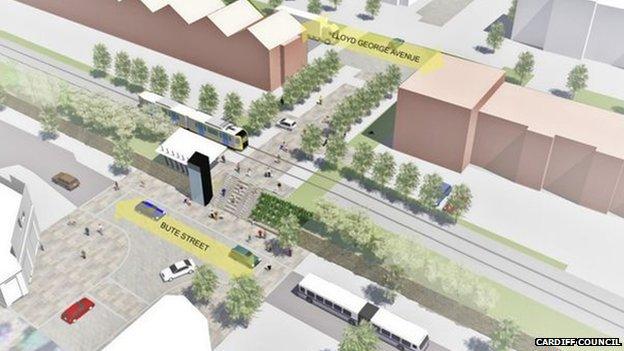Cardiff metro: Plan encourages people to 'leave cars at home'
- Published
The metro project aims to improve transport links between Cardiff and south east Wales
Plans for a regional transport system aimed at encouraging more people to leave their cars at home have been backed by Cardiff's cabinet.
The metro project is aimed at improving transport links between Cardiff and south east Wales.
The entire network, which could be built by 2030 and would involve trains, buses and trams, could cost £4bn.
More than 77,000 people commute into Cardiff each day with a large majority travelling by road.
The scheme which was discussed by senior Cardiff councillors, external on Friday could see a transport corridor developed into Rhondda Cynon Taf.
The full council is to be asked to set up a task group to build the Cardiff elements of the network, estimated at £220m.
The first phase of improvements between Cardiff Bay and the city centre are predicted to cost £18m.
The second phase costing £44m would involve work around Callaghan Square connecting to Cardiff Central railway station.

The first phase of improvements between Cardiff Bay and the city centre could cost £18m, says the report
Reusing the disused City Line in Fairwater through to Creigiau and, with additional improvements, on to Rhondda Cynon Taf could cost a further £161m.
For the last two years the Metro Consortium, with members including some of the biggest businesses in south Wales, has been looking at how the city and the wider region can continue to develop into the future with improved transport and infrastructure at its heart.
'Adventurous'
It aims to improve access to the capital from the Merthyr, Rhymney. Gwent, Rhondda and Neath valleys, according to the report.
The number of commuters could rise with a further 30,000 properties planned to be built in the city to meet expected growth.
Councillor Graham Hinchey, cabinet member for strategic planning and transport, said a regional metro system was a "proven and demonstrable" way of getting commuters out of cars, as shown in Manchester and Nottingham.
He said: "A tram-train is equal to 177 cars - equal to three large buses. The tram-train can run in bus lanes, it can run on the road, it can then convert onto the main train track system.
"It's probably the most adventurous system that people will move out of the car into."
He added: "In the past we've had some concepts that have been futuristic rather than realistic - the ULTra [Urban Light Transport project] was one.
"We're not talking about Disneyland, we're not talking about fairies. As long as it's cheap and secure, and is integrated with other modes of transport, it will work."
Council tax
Meanwhile, at the same meeting on Friday, cabinet councillors also backed a report outlining a 3.97% council tax rise as the local authority looks to save around £50m from its budget.
The proposals include cutting the equivalent of around 600 jobs from its pay bill.
Almost a third, 190, would be through voluntary redundancy, with some 130 posts left unfilled while around 70 staff would be redeployed.
A further 225 jobs are expected to be shaved off the wages bill by restructuring council services or finding alternative ways of providing services, say council officers.
The proposals for staff also include reducing the working week from 37 hours to 36 hours and ceasing to pay professional subscriptions or relocation costs.
Cardiff council faces a 2.9% reduction in its cash funding from the Welsh government.
The authority's budget and plan to set up a metro task group will both be subject to a vote by the full council on Thursday 27 February.
- Published21 February 2014
- Published22 March 2013
- Published19 March 2013
- Published31 December 2012
- Published12 April 2011
- Published1 February 2011